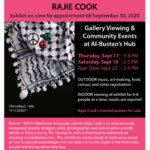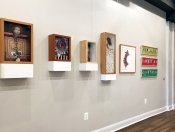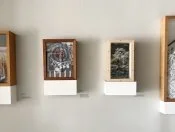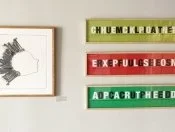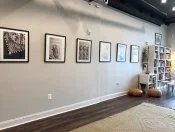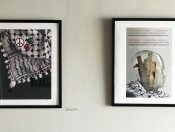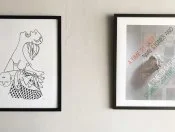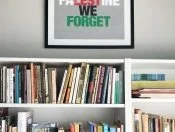Vision of Palestine: Works by Rajie Cook
My heart goes out to the Palestinian people, my inspiration and my hope. Some folks say that the issues in Palestine will never be solved. I say, they won’t be solved until the Palestinian people experience justice. I believe it has been my calling to help create awareness for a people who have been living under occupation, and I pray for peace and for each and every individual. — Rajie Cook, December 2016
Al-Bustan is pleased to present VISION OF PALESTINE -- artworks by RAJIE COOK, an internationally recognized Palestinian-American graphic designer, artist, and activist who currently resides in Bucks County, PA.
During his visits to Palestine, Cook witnessed an ongoing humanitarian crisis. This led him to create a body of work using poster art and sculptural assemblages that call attention to the plight of the Palestinian people and the injustices they face.
Gallery Viewing & Community Events at Al-Bustan's Hub
Thursday, September 17 | 5-8 PM
Saturday, September 19 | 2-5 PM
Rain date: September 20 | 2-5 PM
OUTDOOR
Art-making led by Lisa Volta
Take-Away food by Indian Sizzler, Woosa Tea, & Pita Chip
Voter Registration by West Powelton Saunders Park Civic Association
Census by Philly Counts
Thursday | 5:30-7:30pm
Music by saxophonist Yesseh Furaha-Ali and drummer Nazir Ebo
Saturday | 2:30 - 4:30pm
Music by percussionists Hafez Kotain and Daryl Kwasi Burgee
INDOOR viewing of exhibit for 6-8 people at a time, masks are required
ON VIEW @ AL-BUSTAN'S HUB: March 13, 2020 - September 30, 2020 | 3645 Lancaster Avenue, Philadelphia 19104
GALLERY HOURS: As our gallery has been closed since March 14 due to COVID-19 pandemic, we are now open for viewing by appointment during month of September. You can follow Al-Bustan on social media to engage around the exhibit
ART FOR SALE: The following works are for sale -- 35% of sales support Al-Bustan programs
(6) framed digital prints (20"x24") on archival paper on display- $500
8 types of digital prints (20"x24") on archival paper available upon order- $200
The Keffiyeh poster - $25
A Vision For My Father book by Rajie Cook- $35 Book sale at hub or click here to buy the book online
Rajie Cook
My art will be my voice long after I have gone. It will never be silenced.
Rajie Cook was 51 years old when he visited Palestine for the first time. His father had died the year before, and Rajie made the trip, in part, to honor his father’s memory by going back to the place his parents had left in 1927, three years before Rajie was born. Rajie had grown up hearing his father’s vivid tales from his childhood — memories of walking several miles to Jerusalem in the shadow of the Dome of the Rock to sell eggs that his mother had exchanged with the Bedouins for vegetables. Memories of guiding tourists through the Garden of Gethsemane, where he made the stories and characters from the Bible come to life.
The Middle East that Rajie visited in 1981 clashed with his father’s turn of the century recollections. Rajie was not prepared for the human tragedy he encountered. The abject conditions, the daily humiliations, the oppression and violence displaced Palestinians endured, whether living in refugee camps in Jordan or waiting for hours at checkpoints just to get to work in Jerusalem touched him deeply. That homecoming was his awakening, transforming Rajie into an activist and advocate for human rights in Palestine.
In 1989, he returned to Palestine again, as a layperson in a humanitarian task force led by the U.S. Presbyterian Church. “It was obvious to us that something was terribly wrong….” he recalls the horrific living conditions in the refugee camps of Gaza. “As I was leaving, boarding on the bus, I asked, ‘What can I do?’” He wanted the world to recognize the humanitarian crisis taking place in the Occupied Territories.
After retiring from his career as a graphic designer, Rajie started making art that communicates with the same force and economy as the signage and ads he once designed. In his sculptural assemblages, he repurposes ordinary objects to create indelible images that expose and protest human rights abuses in the Middle East, especially in Palestine, his parents’ homeland. Objects such as rocks, keys, dolls’ heads, plastic hands, or a metal faucet serve as three-dimensional pictograms conveying poignant, political messages. A cast-iron bird with a Palestinian flag entwined in barbed wire, represents a dove of peace, unable to fly free. The keys, a recurring motif in Rajie’s art, refer to the homes lost by more than 800,000 Palestinians by 1949. The women he met in refugee camps in his travels to Palestine still wear the keys to their former homes around their necks, totems of hope for eventual return.
—written by Ann de Forest, as part of (DIS)PLACED: Philadelphia | Expressions of Identity in Transition

